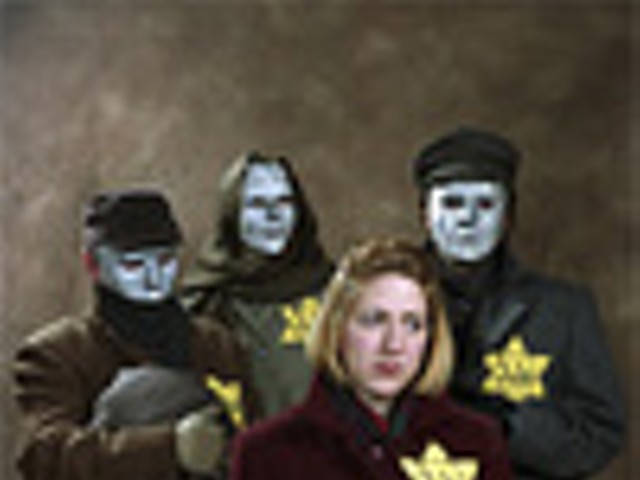The premise here is that we're in a Harlem nightclub — though not too literal a club, because we also find ourselves visiting a radio station. In Act Two, as the mood turns somber, we even infiltrate Waller's mind. But at the outset spirits are bright. When they're not singing, the five rambunctious actors sit at tables observing the action. There's something intangibly wonderful about watching performers watching performers. Anita Jackson's peach-fuzz rendition of "Squeeze Me" would be terrific all by itself, but it's even peachier when her four cohorts take a shared pride in her smooth delivery. The ensemble establishes the show's loving tone simply by remaining onstage — and by being glad to be there.
In addition to five strong voices, Ain't Misbehavin' emphasizes the ensemble's ten hands and fifty fingers. In Act One especially, those hands and fingers are in constant motion, stirring up more air than the two ceiling fans. Choreographer Nicole Thomas and director Ron Himes would have us believe that all five performers, male and female alike, are Waller clones who might be tickling imaginary ivories whenever they're in action. Costume designer Myrna Colley-Lee has either had a field day or a nervous breakdown garbing these five in boldly outlandish colors that suggest she's doing preliminary work on the Black Rep's Guys and Dolls later this season. Don't bother looking for any fake rhinestone jewelry in local dime stores this month. It's all onstage — though Julia Nixon is more plainly adorned in polka dots and pearls. Late in Act One Nixon has great fun with a forgotten gem, the 1942 war ditty "Cash for Your Trash."
Act Two takes a more introspective tone. Though it begins humorously enough with Drummond Crenshaw's self-deprecating "Lounging at the Waldorf" ("Anchovies? I never heard of such a thing!"), soon enough J. Samuel Davis is leading us into a state of high suspension with his transfixing "Viper's Drag," a variation on the more traditional "Reefer Song." Apparently, as an infant Davis was taught to dance before he learned to walk. All these years later he simply refuses to take a step if he can glide instead. He is a pleasure to watch, an ice skater who doesn't bother with skates. By contrast, Teressa Renee' Williams is all stillness as she sits on the bench next to musical director Charles Creath (who serves as Waller's piano-playing stand-in) and caresses her way through "Keeping Out of Mischief Now" in a coy manner that suggests she's doing anything but.
Ain't Misbehavin' climaxes with the haunting "Black and Blue," which, as a trumpet solo in the 1929 Broadway musical Hot Chocolates, launched Louis Armstrong on the road to immortality. In tandem with the original lyric by Andy Razaf ("I'm white inside, but that don't help my case/'Cause I can't hide what is on my face"), Waller's sorrowful melody is suffused with pain. Only now, as the ensemble unites to sing in splendid isolation, are the evening's ambitions fully realized. What began as an idealized snapshot of the past has become a searing scar, revealing a revue that is more rueful than it purports to be.





